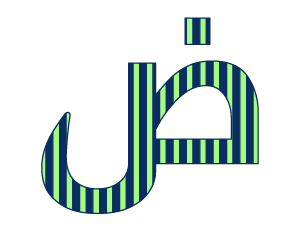Words which have two repeated or doubled letters in its root (base).
We will divide the doubled verb into two categories as the rules for each differ.
| Doubled verbs | |
| Triliteral verbs | Quadrilateral verbs |
Triliteral verbs are verbs with three radicals or letters in its root. Whereas quadrilateral verbs have four radicals.
Trilileral Doubled Verbs
These are three letter verbs where the 2nd and 3rd letters are the same. For example: شَدَّ، رَدَّ.
| Command | Present | Past |
| رٌدّ/أُرْدد | يَرُدُّ | رَدَّ |
| شُدّ/ أُشْدُدْ | يَشُدُّ | شَدَّ |
| دُقّ/أُدقُق | يَدُقُّ | دقَّ |
- Here the verb looks like it has only two letters in its stem. But actually there are three letters as the second letter of the verb has a Shaddah ّ on it which represents the letter repeating twice. رَدَّ = رَدَدَ.
- When using the verb in the past tense, the duplicated letters can be unfolded in the case of ( تاء الفاعل – نا الفاعلين – نون النسوة). Eg.: رَدَدْتُ / رَدَدْتَ / رَدَدْتِ / رَدَدْتُمَا / رَدَدْنَا / رَدَدْنَ.
- When using the verb in present tenses, the duplicated letters can be unfolded when assigned to نون النسوة. Eg.: يَرْدُدْنَ / تَرْدُدْنَ
- When using the verb in the imperative tense, the duplicated letters can be unfolded when assigned to (نون النسوة and we should add Hamza to the beginning of the verb as in ردَّ : أَردُدنَ.
Quadriliteral Doubled Verbs
These are verbs with four radicals in their root. The first and third radicals are the same also the second and fourth radicals are the same too . Eg.: زَلْزَلَ
These verbs follow normal conjugation.
| Command | Present | Past |
| زَلْزِلْ | يُزَلْزِلُ | زَلْزَلَ |
| عَسعِسْ | يُعَسعِسُ | عَسْعَسَ |
| سَلْسِلْ | يُسَلْسِلُ | سَلسَلَ |
In this case, the verbs are conjugated normally.
| past tense | ||||
|---|---|---|---|---|
| Plural | Dual | Singular | – | |
| Third Person | رَدّواthey replied | رَدّاthey replied | رَدَّhe replied | M |
| رَدَدْنَthey replied | رَدَّتاthey replied | رَدَّتْshe replied | F | |
| Second Person | رَدَدْتُمْyou replied | رَدَدْتُماyou replied | رَدَدْتَyou replied | M |
| رَدَدْتُنَّyou replied | رَدَدْتُماyou replied | رَدَدْتِyou replied | F | |
| First Person | رَدَدْناwe replied | رَدَدْتُI replied | M & F | |
| present tense | ||||
|---|---|---|---|---|
| Plural | Dual | Singular | – | |
| Third Person | يَرُدّونَthey replied | يَرُدّانِthey reply | يَرُدُّhe replies | M |
| يَرْدُدْنَthey replied | تَرُدّانِthey replied | تَرُدُّshe replies | F | |
| Second Person | تَرُدُّونَyou replied | تَرُدّانِyou replied | تَرُدُّyou replied | M |
| تَرْدُدْنَyou replied | تَرُدّانِyou replied | تَرُدّينَyou replied | F | |
| First Person | نَرُدُّyou replied | أَرُدُّyou replied | M & F | |
| imperative(command) tense | ||||
|---|---|---|---|---|
| Plural | Dual | Singular | .. | |
| Third Person | .. | .. | .. | M |
| .. | .. | .. | F | |
| Second Person | رُدّواreply | رُدّاreply | رُدَّ \ أُرْدُدْreply | M |
| أُرْدُدْنَreply | رُدّاreply | رُدّيreply | F | |
| First Person | .. | .. | .. | M & F |


